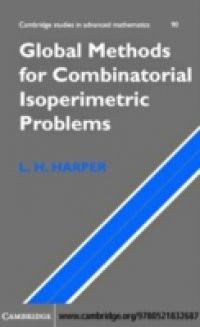Certain constrained combinatorial optimization problems have a natural analogue in the continuous setting of the classical isoperimetric problem. The study of so called combinatorial isoperimetric problems exploits similarities between these two, seemingly disparate, settings. This text focuses on global methods. This means that morphisms, typically arising from symmetry or direct product decomposition, are employed to transform new problems into more restricted and easily solvable settings whilst preserving essential structure. This book is based on Professor Harper's many years' experience in teaching this subject and is ideal for graduate students entering the field. The author has increased the utility of the text for teaching by including worked examples, exercises and material about applications to computer science. Applied systematically, the global point of view can lead to surprising insights and results, and established researchers will find this to be a valuable reference work on an innovative method for problem solving.




 9.67 (3)
9.67 (3) 














